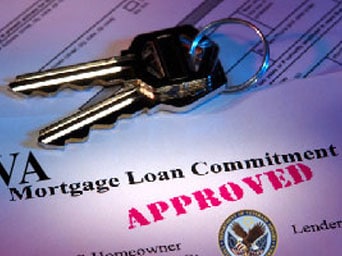 As banks tighten lending standards, demand has increased tremendously for Veterans Affairs mortgages, known as VA loans. — The VA loan is one of the few mortgage options for borrowers who don’t have down payments, and is available to more than 22 million veterans and active military members.
As banks tighten lending standards, demand has increased tremendously for Veterans Affairs mortgages, known as VA loans. — The VA loan is one of the few mortgage options for borrowers who don’t have down payments, and is available to more than 22 million veterans and active military members.
The U.S. Department of Veterans Affairs is not a direct lender. The loan is made through a private lender and partially guaranteed by the VA, as long as guidelines are met.
The VA has guaranteed nearly 500,000 loans so far this year, says John Bell, assistant director of loan policy at the VA. That’s 30 percent more than last year, and nearly three times the number of VA loans issued in 2008.
Some must-knows about the program:
— Most members of the military, veterans, reservists and National Guard members are eligible to apply. Spouses of military members who died while on active duty or as a result of a service-connected disability may also apply.
— Active-duty members generally qualify after about six months of service. Reservists and members of the National Guard must wait six years to apply, but if they are called to active duty before that, they gain eligibility after 181 days of service.
“Most reservists are qualifying under active duty,” says Michael Frueh, loan guaranty director for the Department of Veterans Affairs.
— Reservists, members of the National Guard and active-duty members generally are eligible after 90 days of service during war periods.
“If you were on any type of foreign soil, more than likely you are eligible,” says Grant Moon, a veteran and president of VA Loan Captain Inc., a loan referral company.
— Potential borrowers must obtain a certificate of eligibility before applying. The form can be submitted online.
— Loans guaranteed by the VA can be obtained without a down payment.
A VA loan doesn’t require mortgage insurance, like Federal Housing Administration and conventional loans do with less than a 20 percent down payment. That translates into significant monthly savings for VA borrowers. For instance, a borrower who takes a $200,000 FHA-insured mortgage pays more than $200 a month for mortgage insurance.
The costs of getting a VA loan are generally lower than other types of low down payment mortgages, but they still carry a one-time funding fee that varies, depending on the amount of the down payment and the type of veteran.
A borrower getting a VA loan for the first time, with zero down payment, would pay a fee of 2.15 percent of the loan amount, Frueh says. The fee is reduced to 1.25 percent of the loan amount if the borrower makes a 10 percent down payment. Reservists and National Guard members normally pay about a quarter of a percentage point more than active-duty members.
Those using the VA loan program for the second time, without a down payment, would pay 3.3 percent of the total loan amount.
“And if you receive disability compensation, the fee is waived,” Frueh says.
Veterans Affairs does not require a minimum credit score for a VA loan, but lenders generally have their own internal requirements. Most lenders ask for a credit score of 620 or higher, Moon says.
VA guidelines allow veterans to use their home-loan benefits a year or two after bankruptcy or foreclosure.
VA loans are available only to finance a primary home.
The limit on VA loans varies by location, but is $417,000 in most parts of the country and up to $1,094,625 in high-cost areas.
If the borrower of a VA loan can’t make payments on the mortgage, the VA can negotiate with the lender on behalf of the borrower.
“We have dedicated staff nationwide committed to helping veterans who are experiencing financial difficulty,” Bell says.
Last year, the VA helped about 73,000 veterans avoid foreclosure, he says.
No matter what kind of loan they have, veterans who are struggling to make mortgage payments can call (800) 827-l000 for assistance.
X…X…X
Mortgage rates barely changed this week. The 30-year fixed-rate mortgage rose 2 basis points to 3.81 percent. A basis point is one-hundredth of 1 percentage point.
The 15-year fixed-rate mortgage was 3.04 percent. The average rate for 30-year jumbo mortgages, or generally for those of more than $417,000, rose 3 basis points to 4.36 percent.
The 5/1 adjustable-rate mortgage fell 1 basis point to 2.75 percent. With a 5/1 ARM, the rate is fixed for five years and adjusted annually thereafter.
The volume of mortgage applications decreased 11.1 percent last week, according to the Mortgage Bankers Association.
Source: The Republic
ATTENTION READERS
We See The World From All Sides and Want YOU To Be Fully InformedIn fact, intentional disinformation is a disgraceful scourge in media today. So to assuage any possible errant incorrect information posted herein, we strongly encourage you to seek corroboration from other non-VT sources before forming an educated opinion.
About VT - Policies & Disclosures - Comment Policy



